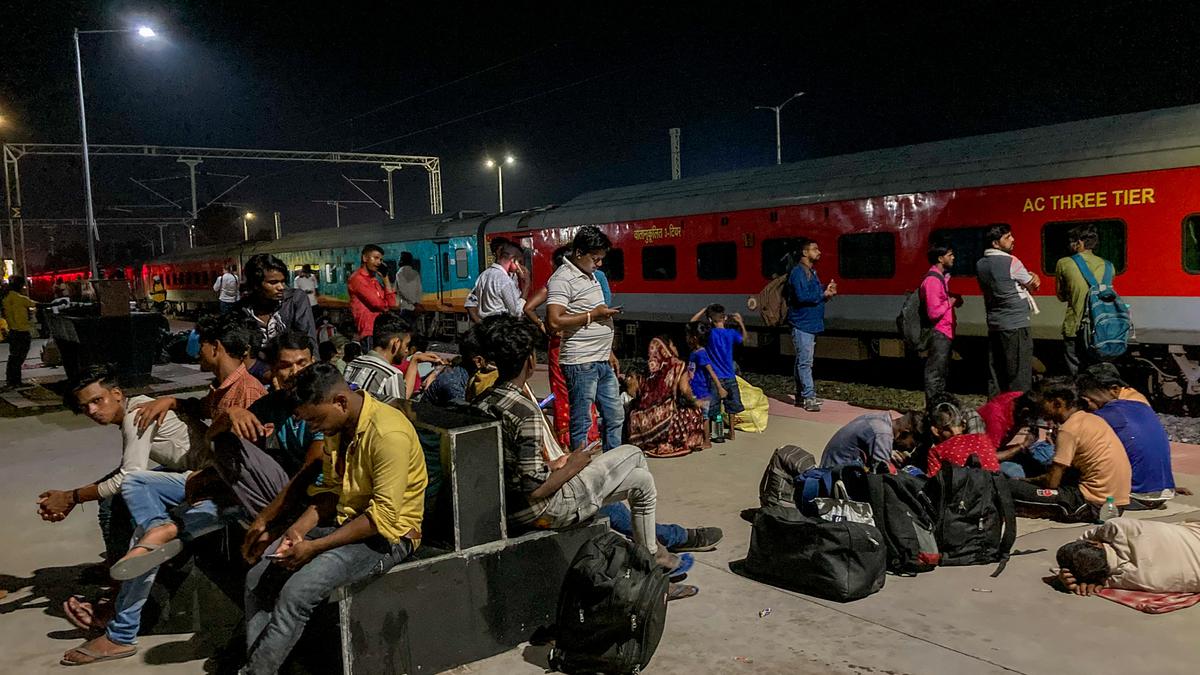
Do Delhi’s migrants approve the idea of remote voting? | Data

Forbesganj railway station, BIHAR, SEPT 2023: where migrants come in hoarded every night to catch Delhi bound Seemanchal Express
| Photo Credit: Amarnath Tewari
In late 2022, the Election Commission of India (ECI) proposed a Remote EVM (R-EVM) to address issues related to domestic migrant voting. The goal was to improve the 67.4% voter turnout in the 2019 general election. The ECI held an all-party meeting where most political parties raised different kinds of concerns and suggested that there is need for more discussion on this issue.
To gauge public trust in the proposed system, a survey by Lokniti-CSDS was conducted in September 2023, involving 1,017 migrants living in Delhi’s slums, with 63% men and 37% women. The survey aimed to understand whether the proposed R-EVM system would gain the viable level of trust among its intended users, setting aside legal and logistical concerns raised by political parties.
The biggest chunk of migrants in Delhi, almost half, come from the neighbouring Uttar Pradesh followed by Bihar (22%), West Bengal (8%) and Rajasthan (7%). The surveyed migrants stated employment opportunities as the primary reason for relocation (58%). However, the second most cited reason was family-related reasons (18%) followed by relocation due to marriage (13%). Of the people who moved for family reasons or due to marriage, an overwhelmingly high proportion were women.
Over three in five (61%) amongst Delhi’s migrants have lived in Delhi for more than five years, whereas 9% came to Delhi recently and have lived in Delhi for less than a year. The data also suggest that a majority of migrants from Uttar Pradesh (68%) and Rajasthan (62%) have lived in Delhi for more than five years whereas a higher number of people from Bihar (14%) migrated recently.
Nearly four in five (75%) migrants stated that they have been living in Delhi for a long time; whereas 18% came for a short period. This number suggests that their stay in Delhi is temporary, for work such as construction and other allied activities. When we look at the regional profile of the short-term migrants, one can observe that a comparatively higher proportion of people from Bihar (24%) come to Delhi for short-term work; the other States’ percentages being similar. This suggests that people from Bihar are more prone to seasonal migration due to the State’s economic activities/opportunities.
Nearly half (53%) the migrants have registered themselves as voters in Delhi while nearly one in four (27%) are registered as voters in their home State. Furthermore, 9% of them are registered voters in both Delhi and their home State. Looking at the electoral participation of Delhi’s migrants at different levels of elections — local/panchayat, Assembly, and national elections, one can observe that they participate more in national and State level elections than the local elections (Table 1).
Table 1 | Electoral participation of Delhi’s migrants at different levels of elections
Tables appear incomplete? Click to remove AMP mode
Migrants from Bihar and Uttar Pradesh maintain strong connections to their local political units, with substantial numbers, 26% and 24% respectively voting in local elections there. In State Assembly elections, a comparatively high number of people from West Bengal (35%) went back to the State to cast their vote. This could be attributed to a sense of responsibility towards their home State’s political landscape.
Looking at the reasons people went back to vote, 40% of the people went back home to exercise their fundamental right to vote (Table 2). This shows a reasonably high level of permeation of ideas of fundamental rights. One in four persons also use election season as another reason to visit their family at home.
Table 2 | Reasons given by migrants for going back home to vote
The survey’s central question revolved around trust in a proposed remote voting system. Overall, 47% of respondents tended to trust this system, while 31% expressed distrust (Table 3). Notably, 23% did not share their opinion, potentially indicating complexities in the proposed system. When analysed by gender, men showed greater trust (50%) compared to women (40%), with more women (32%) responding with ‘can’t say,’. This is probably down to women’s low involvement in politics due to a range of structural reasons.
Table 3 | Extent to which migrants trust the secrecy of your ballot in case remote voting is allowed
Trust in the system increased with higher education levels, suggesting that better-educated individuals had more faith in the idea of remote voting. Conversely, lower-educated respondents were more likely to refrain from sharing this opinion. This indicates that people having low educational attainments find it difficult to come to a conclusive opinion about a seemingly complex system.
Examining trust across States, migrants from West Bengal had the highest trust levels at 53%, followed by Uttar Pradesh and Rajasthan at 50% and 49%, respectively. However, in Rajasthan, a significant 39% expressed distrust. Bihar had the lowest trust at 41%, with high ‘can’t say’ responses (26%).
The ECI for the time being has shelved the idea of introducing R-EVMs because most political parties did not support the idea. The ECI wanted to use these machines to make it easier for people to vote. However, just relying on technology will not solve all the problems.
Many people do not understand how these new machines work. Democracy works best when people are actively involved in their local elections, but that is not always happening. Giving people easier ways to vote is good, but it is not enough. Increasing electoral participation alone does not deepen democracy. We need to teach more people about the values of democracy and make sure they understand why it is important.
Source: Centre for the Study of Developing Societies
Also read: Explained | Will migrants be able to vote remotely?
Listen to our podcast |A discussion on Madras HC judgment: Wife can claim a share in husband’s property | Data Point podcast
#Delhis #migrants #approve #idea #remote #voting #Data


